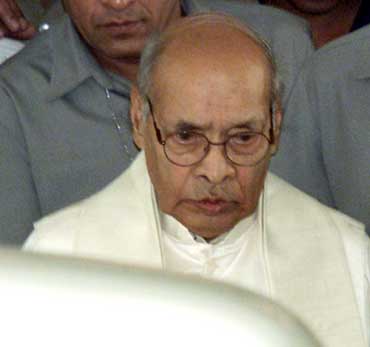
On September 23, 24 and 25, 1992, P V Narasimha Rao, then prime minister, called a meeting with editors of several national newspapers and magazines. The issue was: what should be done with Ayodhya? Most of them came out of the conference confused and disturbed. They wondered if the prime minister's idea of a solution to the Ayodhya tangle was to hand over the disputed structure to the Hindus.
Rao was a worried man. Karsevaks were massing in Ayodhya. Earlier in the week, at a meeting with Rashtriya Swayamsevak Sangh leaders, he is believed to have said: "Mandir banega aur bhavya mandir banega (the temple will be built and it will be a grand one)." And as an afterthought, Rao added: "Lekin masjid hatana theek nahin hai (but it may not be proper to move the mosque)."
Text: Aditi Phadnis
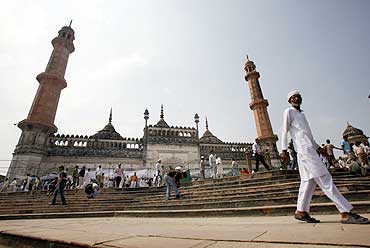
Rao had set up an Ayodhya cell in his office, headed by Naresh Chandra. In an interview to this reporter in October 1992, Chandra was strongly critical of the attempts made by a team of Jawaharlal Nehru University professors to prove historically that Ram was not born in Ayodhya.
"Progressive historians (like Romila Thapar, S Gopal and others) are more keen to present their modern, secular credentials.They want to sound superior and informed, but we find their writings opinionated and argumentative," he had said.
He added, "We would be rejecting history if we were to say that for the last 400 years (since Mir Baqi, a Shia from Iran, built a mosque at the disputed site), Hindus and Muslims have been living happily and sharing the same building for puja and namaz. There has obviously been a temple here. Whether it belonged to Ram or someone else, we don't know because there isn't enough data. But the fact is there have been bitter conflicts over this place, and we cannot brush this aside, as the JNU professors have done."
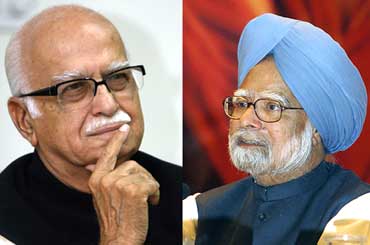
The matter came to a head within two months, before Rao's project could be realised. On December 6 that year, to India's eternal shame, the government was unable to protect India's secularism and the 'disputed structure' was brought down by mobs while the matter was still being heard by the courts. Recalling that event, Prime Minister Manmohan Singh was uncharacteristically cutting about Bharatiya Janata Party leader L K Advani's role.
"Unlike the National Democratic Alliance's prime ministerial candidate, I will not be found weeping in a corner while hoodlums tear down a centuries-old mosque," he commented witheringly last year.
This time around, when the Lucknow bench of the Allahabad high court has given its verdict, the law and order management has been exemplary. Not only have there been no incidents, there is a conspicuous build-up of security forces, and 'miscreants' have been punished promptly (like the two boys from Kollam, Kerala who were found to have sent incendiary text messages). There is little patience with communal forces, although a Congress government is in power again and the man who was finance minister then is prime minister now.

So what has changed between 1992 and 2010?
Obviously that was a different time, a different atmosphere.
Kalyan Singh, who was chief minister at the time of the demolition, visited Ayodhya on September 16, days before the judgment. Singh tried to sound as he did in 1992, "We will not sit quietly in case the judgment goes against the Hindu claim to the disputed site but political parties must stay away from this issue," he said at a public meeting. The 50 people who attended the meeting heard him disinterestedly and dispersed five minutes later.
The Vishwa Hindu Parishad has realised that even when in power, there are some things that a BJP-led government cannot do. On the other hand, the Gujarat government has been unapologetic about pulling the shutters down on the VHP's business dealings. So, one major stream of Hindu mobilisation has simply been disempowered.
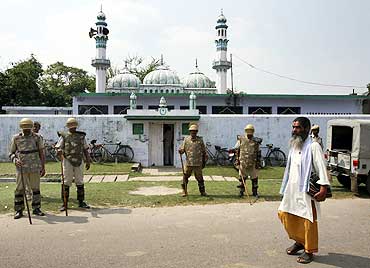
But if we agree that no communal incident in India is ever spontaneous, then it is also true that administrative preparedness can prevent such incidents. In this context, even the Congress organisation concedes that the credit must go to the Uttar Pradesh government headed by Mayawati. Massive police and paramilitary presence was ensured by the UP administration.
In 1992, every jai Shri Ram was captured by TV and radio, anywhere it was uttered. In 2010, when lawyers were addressing the press and claiming credit for 'winning' the case, some cries of jai Shri Ram were simply muted by TV channels.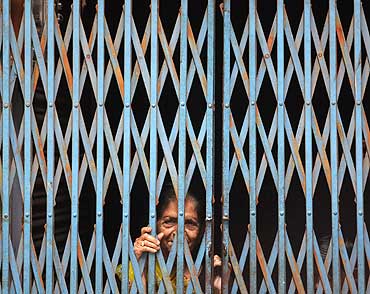
Reactions to the demolition came in March 1993, in the shape of simultaneous bomb blasts all over Mumbai. But between 1993 and 2010, the Shiv Sena has split; and post 26/11, it is a different Mumbai.
So what does it all mean? The biggest difference between 1992 and 2010 is: India has lost the appetite to shed blood over religion. It stands to reason. Hindus have become more religious. But many religious leaders -- well-known ones, not some leading shady sect -- are facing criminal charges ranging from sodomy to murder. Funding to religious institutions, including madarassas, is under scrutiny,
However, Sun Tsu in the Art of War sounds a warning: Do not press a desperate foe too hard. Whoever the winner or loser in Ayodhya, the government needs to remember this.